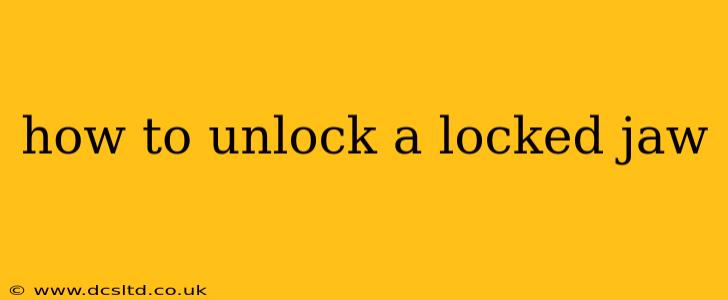A locked jaw, also known as trismus, is a condition where you're unable to open your mouth fully or comfortably. It can range from mild discomfort to severe pain, significantly impacting your ability to eat, speak, and even brush your teeth. Understanding the causes, employing the right treatment, and practicing preventative measures are crucial for managing this condition.
What Causes a Locked Jaw?
Several factors can contribute to a locked jaw. Let's explore the most common ones:
-
Temporomandibular Joint (TMJ) Disorders: The TMJ connects your jawbone to your skull. Problems with this joint, like inflammation or displacement, are a leading cause of trismus. This can result from injury, arthritis, or even stress.
-
Muscle Spasms: Prolonged clenching or grinding of your teeth (bruxism), stress, or even an injury can cause the muscles surrounding your jaw to spasm, leading to a locked jaw.
-
Dental Procedures: Certain dental procedures, like wisdom tooth extractions or root canals, can sometimes cause temporary jaw stiffness or locking as a side effect of the procedure itself or the resulting inflammation.
-
Infections: Infections in the mouth, throat, or jaw area, such as peritonsillar abscess (quinsy) or cellulitis, can lead to inflammation and muscle spasms, resulting in a locked jaw.
-
Trauma: A blow to the jaw or face can easily lead to a locked jaw due to injury to the TMJ or surrounding muscles.
How Can I Unlock My Jaw?
The best approach to unlocking your jaw depends on the underlying cause. Here are some potential solutions:
-
Gentle Stretching and Self-Massage: Gently opening and closing your jaw, and massaging the muscles around your jaw, can help relax tense muscles. Avoid forceful movements, as this can worsen the condition.
-
Heat or Cold Therapy: Applying a warm compress or ice pack to your jaw can reduce inflammation and pain. Experiment to see what provides the most relief. Alternate between warm and cold compresses for better results.
-
Over-the-Counter Pain Relief: Nonsteroidal anti-inflammatory drugs (NSAIDs) like ibuprofen can help manage pain and inflammation. Always follow the recommended dosage.
-
Medication: For severe cases or if the locked jaw is due to an infection, your doctor may prescribe muscle relaxants, antibiotics, or other medications.
-
Professional Treatment: If home remedies don't provide relief, seeking professional help is crucial. A dentist, orthodontist, or physician specializing in TMJ disorders can diagnose the underlying cause and recommend appropriate treatment, such as physical therapy, splints, or surgery (in severe cases).
What are the Home Remedies for a Locked Jaw?
Several home remedies can provide relief from a mild locked jaw:
-
Warm Compresses: Applying a warm, damp cloth to your jaw can help relax the muscles.
-
Gentle Jaw Exercises: Slowly and gently open and close your mouth, avoiding any pain. This can help improve jaw mobility.
-
Over-the-Counter Pain Relief: NSAIDs such as ibuprofen or naproxen can help alleviate pain and inflammation.
-
Hydration: Drinking plenty of water helps maintain muscle flexibility and can aid in reducing inflammation.
How Long Does a Locked Jaw Last?
The duration of a locked jaw varies significantly depending on the underlying cause and treatment. A mild case resulting from muscle spasms might resolve within a few days with home remedies. However, more serious cases caused by infections or TMJ disorders might require weeks or months of treatment. If your locked jaw persists for more than a few days, or is accompanied by severe pain or other symptoms, seeking professional medical attention is strongly recommended.
Can a Locked Jaw Be Prevented?
While not all causes of locked jaw are preventable, you can take steps to reduce your risk:
-
Manage Stress: Stress can exacerbate muscle tension, leading to jaw clenching and spasms. Practicing stress-management techniques like yoga or meditation can be helpful.
-
Avoid Clenching or Grinding Your Teeth: If you are a bruxer, you may need a mouthguard.
-
Maintain Good Oral Hygiene: Regular dental check-ups and good oral hygiene can help prevent infections that may lead to a locked jaw.
-
Proper Posture: Maintaining correct posture can help prevent strain on your jaw and neck muscles.
This information is for general knowledge and does not constitute medical advice. Always consult with a healthcare professional for diagnosis and treatment of any medical condition. They can provide personalized advice based on your specific situation and needs.
